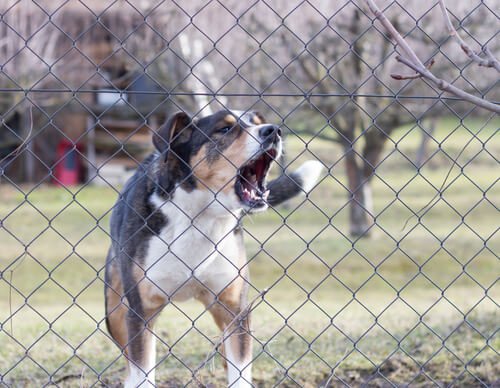5 Recommendations for Dealing with Your Dog's Aggression

Dealing with your dog’s aggression can be a challenging, especially for people who have never seen their dog act this way before. The truth is that these cases can become very scary because there is a risk of serious injury while trying to calm the animal.
However, the reasons why dogs act this way can vary. So, dealing with a dog’s behavior may have more than one solution, but the difficulty all depends on each d0g. First, let’s talk about aggression.
What is aggression in dogs?
Aggression is an instinctive reaction of an animal to certain situations or stimuli. These stimuli aren’t always due to imminent danger or an attack by another animal. Normally, they are a reaction to panic or even pain.
So, dogs aren’t aggressive because they intentionally want to cause harm, but rather because they’re responding to an animal instinct. When they’re injured, a violent reaction is normal because they don’t understand why they feeling pain or ill.
However, aggression isn’t always the product of pain. Sometimes, it’s a behavioral problem that’s the result of improper training. It’s important to know the signs of aggression, and why they’re acting this way in order to be able to treat it.

Causes of aggression in dogs
A dog can be aggressive for different reasons. Many of these reactions are a response to their primary instincts from when they were wild animals. We’ve already talked a bit about how aggression is a reaction to pain, but it can also be a reaction to a disease.
Dermatitis and oral diseases can be the main triggers for aggression in dogs. This is due to the intense irritation that the animal experiences in their body, or the swelling in their mouth.
The animal doesn’t understand what is happening to their body, so they react in this manner out of fear and pain. Also, an animal may react this way to protect their family, which is common for mothers that just had their first litter. .
A maternal instinct is a great force that moves the animal world, and dogs aren’t an exception to this rule. A mother is capable of doing anything, including sacrificing her own life, for the well-being of her puppies. Therefore, aggression is a defense mechanism.
Another reason why dogs may become aggressive is when they’re defending their territory. You may often hear about guard dogs and how aggressive they can be, and this is because they’re defending their territory. So, it’s important to present yourself well to a dog that isn’t familiar with you.
Also, dogs react violently when they’re interrupted while eating. They do this because they’re defending their food so that it doesn’t get stolen by any scavengers. This is why understanding the reason behind your dog’s aggression is vital to dealing with them.

How do you handle your dog’s aggression?
There are several ways you can handle your dog’s aggression, and a large part of the effort is patience and self-confidence. Before using any of these methods that we’ll discuss below, it’s important to talk to your vet in order to rule out any diseases that may be causing your dog’s aggression.
- Don’t inflect pain by punishment: pain is a trigger for aggressive behavior, so it’s important that you don’t inflect any pain on your dog. Try lighter punishments or verbal reprimands instead of force.
- Also, avoid physical contact games: as owners, we know that playing with our dogs is fun, but sometimes it can reflect in your animal’s behavior. This is because your dog may get carried away and resort to biting during the games.
- Know your pet’s personality: animals with dominant tendencies are usually the most aggressive when they want to assert their dominance on others. Your job as an owner and trainer is to teach your pet to respect the chain of command and to understand that you’re in charge.
- Try not to disturb them while he’s eating or playing: taking their food or favorite toy away can trigger aggression. Remember that they aren’t doing it because it bothers them, but because they feel the need to defend their belongings.
- Considering neutering your dog: many behavioral problems can be corrected by neutering your pet. In addition to making them more submissive, it will also have long-term health benefits.
Dealing with your dog’s aggression can be a challenging, especially for people who have never seen their dog act this way before. The truth is that these cases can become very scary because there is a risk of serious injury while trying to calm the animal.
However, the reasons why dogs act this way can vary. So, dealing with a dog’s behavior may have more than one solution, but the difficulty all depends on each d0g. First, let’s talk about aggression.
What is aggression in dogs?
Aggression is an instinctive reaction of an animal to certain situations or stimuli. These stimuli aren’t always due to imminent danger or an attack by another animal. Normally, they are a reaction to panic or even pain.
So, dogs aren’t aggressive because they intentionally want to cause harm, but rather because they’re responding to an animal instinct. When they’re injured, a violent reaction is normal because they don’t understand why they feeling pain or ill.
However, aggression isn’t always the product of pain. Sometimes, it’s a behavioral problem that’s the result of improper training. It’s important to know the signs of aggression, and why they’re acting this way in order to be able to treat it.

Causes of aggression in dogs
A dog can be aggressive for different reasons. Many of these reactions are a response to their primary instincts from when they were wild animals. We’ve already talked a bit about how aggression is a reaction to pain, but it can also be a reaction to a disease.
Dermatitis and oral diseases can be the main triggers for aggression in dogs. This is due to the intense irritation that the animal experiences in their body, or the swelling in their mouth.
The animal doesn’t understand what is happening to their body, so they react in this manner out of fear and pain. Also, an animal may react this way to protect their family, which is common for mothers that just had their first litter. .
A maternal instinct is a great force that moves the animal world, and dogs aren’t an exception to this rule. A mother is capable of doing anything, including sacrificing her own life, for the well-being of her puppies. Therefore, aggression is a defense mechanism.
Another reason why dogs may become aggressive is when they’re defending their territory. You may often hear about guard dogs and how aggressive they can be, and this is because they’re defending their territory. So, it’s important to present yourself well to a dog that isn’t familiar with you.
Also, dogs react violently when they’re interrupted while eating. They do this because they’re defending their food so that it doesn’t get stolen by any scavengers. This is why understanding the reason behind your dog’s aggression is vital to dealing with them.

How do you handle your dog’s aggression?
There are several ways you can handle your dog’s aggression, and a large part of the effort is patience and self-confidence. Before using any of these methods that we’ll discuss below, it’s important to talk to your vet in order to rule out any diseases that may be causing your dog’s aggression.
- Don’t inflect pain by punishment: pain is a trigger for aggressive behavior, so it’s important that you don’t inflect any pain on your dog. Try lighter punishments or verbal reprimands instead of force.
- Also, avoid physical contact games: as owners, we know that playing with our dogs is fun, but sometimes it can reflect in your animal’s behavior. This is because your dog may get carried away and resort to biting during the games.
- Know your pet’s personality: animals with dominant tendencies are usually the most aggressive when they want to assert their dominance on others. Your job as an owner and trainer is to teach your pet to respect the chain of command and to understand that you’re in charge.
- Try not to disturb them while he’s eating or playing: taking their food or favorite toy away can trigger aggression. Remember that they aren’t doing it because it bothers them, but because they feel the need to defend their belongings.
- Considering neutering your dog: many behavioral problems can be corrected by neutering your pet. In addition to making them more submissive, it will also have long-term health benefits.
This text is provided for informational purposes only and does not replace consultation with a professional. If in doubt, consult your specialist.







